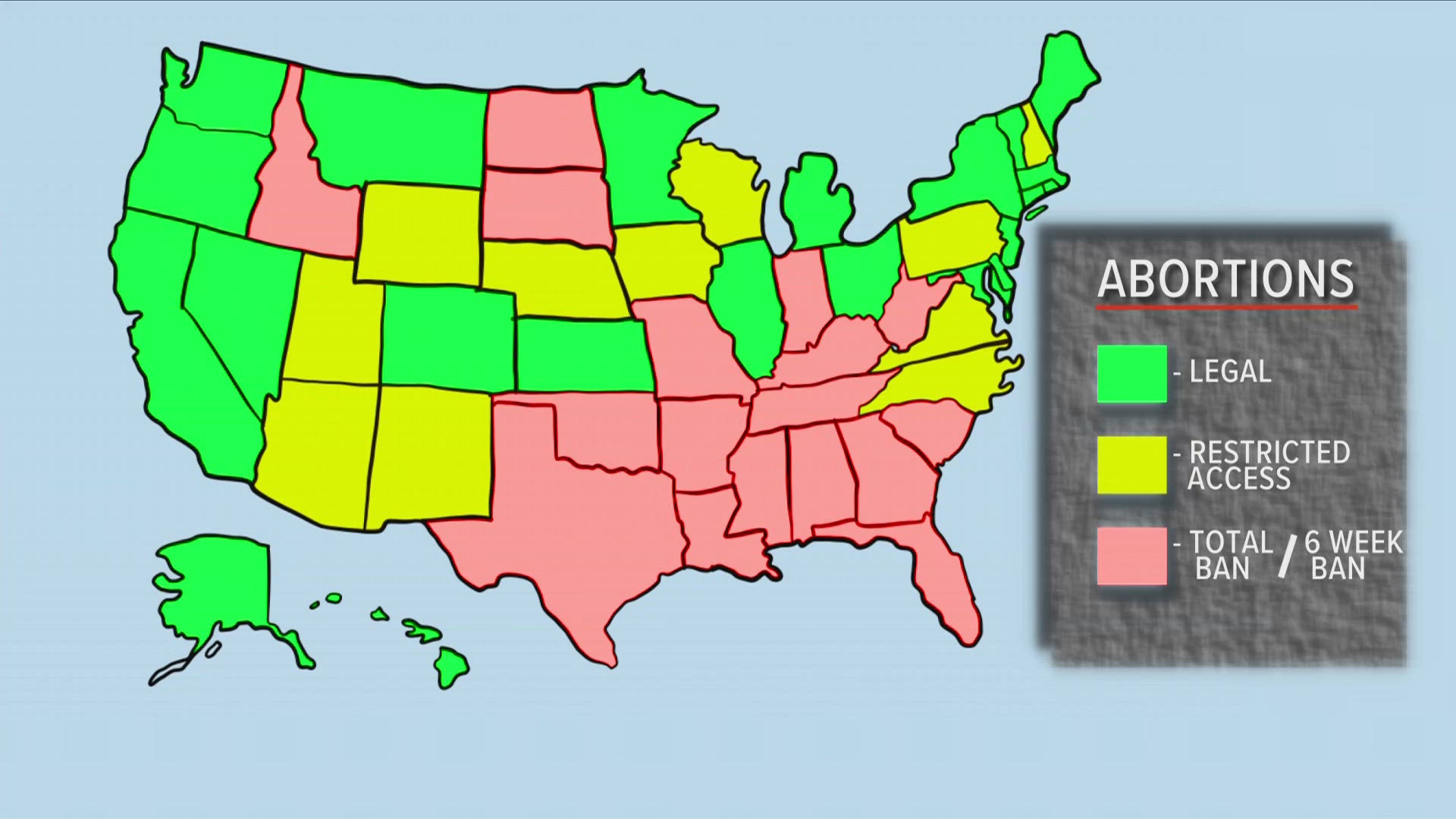MEMPHIS, Tenn. — Two years ago, on June 24th, 2022, the United States Supreme Court overturned Roe v. Wade with the Dobbs v. Jackson Women's Health Organization decision.
Susan Lovato with Memphis Coalition for Life took the decision to let individual states regulate abortion as a win, saying she was filled with joy on that day.
"That's why this office exists. This office exists so that babies will live," Lovato said.
However, it was a huge loss for Jennifer Pepper, the CEO of Choices Center for Reproductive Health, which had provided abortions in Memphis since 1974.
"We couldn't stomach the idea that we wouldn't be able to help the people that had relied on us for over five decades to take care of them," Pepper said.
Abortions are banned in Tennessee, Mississippi and Arkansas, with an exception if the mother's life is in jeopardy. Mississippi is the only one out of the three states that allows an abortion if the pregnancy resulted from rape.
"Anything that happens to the mother - incest, abuse - it doesn't change the sacredness of that life," Lovato said.
Lovato added that the Memphis Coalition for Life has advocates stand on the sidewalk at Choices and Planned Parenthood, offering resources to women who are in crisis.
"I would say 40%-60% of women that we greet are in crisis - they are in a living situation which is unstable," Lovato said.
Since the Dobbs decision, The Society for Family Planning's "We Count" study shows an increase in abortions nationally, from an average of 82,000 abortions per month in 2022 to 86,000 per month in 2023.
The study said Telehealth contributes to the increase. Patients in restricted states can get prescribed abortion pills virtually from states that have "shield laws" legally protecting providers from criminal or civil actions.
The data shows abortions declined in many states that either have a total ban, like Tennessee, Arkansas and Mississippi, or a six-week ban.
States which have expanded access to abortion saw significant increases, according to the study. One of these states is Illinois, the closest one to the Midsouth.
Data from the Guttmacher Institute said more than 170,000 patients traveled for an abortion in 2023.
"We opened a second clinic in southern Illinois, which is a three-hour drive from Memphis and a three-hour drive from Nashville," Pepper said. "Last year, we saw over 3,500 patients there from 21 different states. 95% of those patients were from outside Illinois and primarily Tennessee, Mississippi and Arkansas."
Pepper said a lot of healthcare providers are scared.
"They don't want to lose their license, they don't want to end up in jail, but they want to take care of their patients, so it's a really terrible position to put providers in, and it's the position the state of Tennessee [and other states across the country have] put them in," Pepper said.
In Tennessee, Governor Bill Lee made it a felony for providers to prescribe virtual abortions.
"What Telehealth does, it takes a woman away from a doctor who could recognize a need and a safety issue. The most dangerous parts of pregnancy - which could be ectopic tubal, which is always brought up as the most dangerous thing... A chemical abortion through the abortion pill does not rectify that danger," Lovato said.
Pepper said a Telehealth provider in a state with shield laws can see a patient in Tennessee, but not all Telehealth providers are willing to.
"There are a few out there, but not all of them," Pepper said.
Governor Lee also signed a law to criminalize adults who help minors get an abortion without parental consent, which goes into effect July 1st.
"Parents need to be able to be involved in the healthcare of their children. This involves their children and grandchild," Lovato said.
Pepper has a different opinion on the law.
"There are instances of abuse, there are instances of neglect that make the parent potentially not a safe person for that young person to talk to about pregnancy or their need to access abortion, so those are the young people that this law hurts," Pepper said.
Lovato explained what she hopes the future of reproductive laws in Tennessee will be.
"I don't think it's outside the possibility of prosecuting anyone," Lovato said. "I think that Governor Lee and our legislature is committed to the safety and health of Tennessee residents."
Pepper said "we have potentially not seen the worst that it's going to get."
"There are certainly rumblings around IVF, in vitro fertilization, as well as contraception. This election in 2024 is super important, your state elections are super important, because we are still fighting, and the fight's not over," Pepper said.
Earlier this month, the United States Supreme Court unanimously rejected an effort to restrict access to the abortion pill Mifepristone.
The Alabama Supreme Court is pioneering a new ruling on reproductive rights, declaring that embryos created through IVF are considered children.

